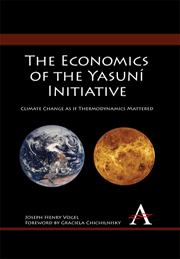Book contents
- Frontmatter
- Contents
- Prologue
- Foreword
- Introduction
- Acknowledgements
- Abbreviations and Acronyms
- The Economics of the Yasuní Initiative
- Chapter 1 Thermodynamics
- Chapter 2 The Tragedy of the Commons
- Chapter 3 The Willful Ignorance of Realpolitik
- Chapter 4 The General Theory of Second Best
- Chapter 5 Through the Bottleneck of a Cowboy Economy
- Conclusions
- Appendix: Annotated YouTube Filmography
- Ordering
- Notes
- Index
Conclusions
Reason for Hope and Despair
Published online by Cambridge University Press: 05 March 2012
- Frontmatter
- Contents
- Prologue
- Foreword
- Introduction
- Acknowledgements
- Abbreviations and Acronyms
- The Economics of the Yasuní Initiative
- Chapter 1 Thermodynamics
- Chapter 2 The Tragedy of the Commons
- Chapter 3 The Willful Ignorance of Realpolitik
- Chapter 4 The General Theory of Second Best
- Chapter 5 Through the Bottleneck of a Cowboy Economy
- Conclusions
- Appendix: Annotated YouTube Filmography
- Ordering
- Notes
- Index
Summary
Politics is a reason for hope and despair. Al Gore is exemplary of how the politician can disabuse a public fervently engaged in denial. That alone is reason for hope. But Al's political career is passé composé. What about the leaders du jour? With science on the side of stabilizing atmospheric carbon, a new generation can impose the necessary limits. Voters in both the North and South have expressed a strong desire for “change we can believe in.” Is the supply of leaders meeting the demand? Unfortunately, in politics there is always reason for despair. Heads of state will find resilience in the system they campaigned to change; relentlessly, the system will try to change the politicians. The first sign of system resilience is a stream of incoherent messages as the politician transitions from the campaign trail to the seat of power. Pronouncements of fossil fuel exploration and a commitment to stabilizing atmospheric carbon is the doublethink that grips both the North and South.
The saving grace is humor, the scarcest of all resources. A clever turn of phrase can pierce the cold indifference of denial and expose the beguiling incoherencies. By the mid-1970s, the economist and polymath Nicholas Georgescu-Roegen had already surmised the fate of business-as-usual:
Perhaps the destiny of man is to have a short but fiery, exciting, and extravagant life rather than a long, uneventful, and vegetative existence. […]
- Type
- Chapter
- Information
- The Economics of the Yasuní InitiativeClimate Change as if Thermodynamics Mattered, pp. 71 - 78Publisher: Anthem PressPrint publication year: 2010



